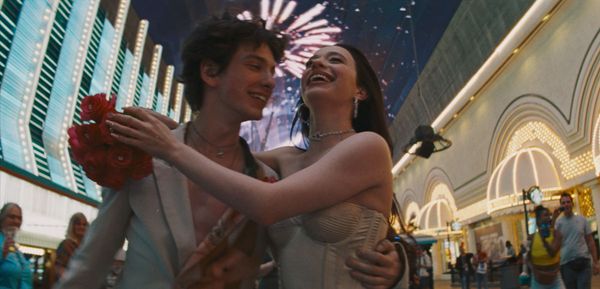Though her name means “light and bright,” those two adjectives are hardly how anyone would describe Ani, Mikey Madison’s titular sex worker with a heart of gold in Sean Baker’s magnificent love story “Anora.” Not because those words aren’t fitting descriptors for Ani, but because she’s far more complex than a couple of attributes you can pull from the etymology section of a mommy blog.
As a writer and director, Baker has dedicated much of his career to elucidating the subtleties of figures like Ani who are often relegated to the background. He’s allowed us to peer inside the fictional lives of trans sex workers on Hollywood Boulevard in his 2015 breakout “Tangerine,” and given us an up-close-and-personal look at a washed-up porn star’s attempt at rebuilding his old life in 2021’s “Red Rocket.” But nothing Baker has made thus far comes close to “Anora,” his Palme d’Or-winning masterpiece primed to make Madison a household name. The dazzling shine of red tinsel woven into Ani’s hair lures you into the film’s whirlwind from the opening sequence. And once you’re in the vortex, enraptured by Madison’s exceptional presence (and the first use of an EDM remix of Take That’s “Greatest Day”), Baker holds you in the film’s joyous grasp for its remaining 139 minutes. Joy rather than euphoria, because as its powerhouse ending shows, the highs of Anora are no ephemeral feeling.
Baker remains at Headquarters, the club Ani works at, as the film sinks into its rhythm. We’re slowly inducted into Ani’s world, watching as she spends the night grinding for tips, schmoozing big spenders, and cutting up with her fellow dancers about the lousy playlists the DJ is cranking. It’s a night just like any other until she meets Ivan (Mark Eydelshteyn), the 19-year-old playboy son of a Russian oligarch, looking to have some fun. Ani is the only girl at Headquarters who speaks Russian, and her rusty language skills picked up from her grandmother perfectly complement Ivan’s sexual naivete and boyish charm. Ani leaves the club at dawn with a few extra hundreds in her purse and Ivan’s number in her phone, but thinks little of it until she gets a text from him asking to come over later that day.
Ani is as enchanted by Ivan’s hyperactive obsession with her as she is his massive home, which soon becomes her big, ugly Brighton Beach ivory tower when Ivan offers to pay for an entire week of the girlfriend experience. Ani enjoys the spoils of Ivan’s fortune during these seven days but remains physically close to him through it all, so when Ivan proposes to her on an impulsive trip to Las Vegas, Ani feels like she may actually be getting both the love and the financial security she’s always longed for. And to her credit, the moment feels natural. Baker remembers the leading way that 20-year-olds struck by their infatuation speak to each other when making big professions of love, with the hope that the right words will fall out of the other person’s mouth. Each syllable burns like an ember, every word tinged with new possibilities. But even with the offer of a four-carat ring, Ani is skeptical. “Don’t tease me with that shit,” she pleads. To Ani, this isn’t a game, and Ivan — like any good operator — makes her believe he feels the same way.
Want a daily wrap-up of all the news and commentary Salon has to offer? Subscribe to our morning newsletter, Crash Course.
It’s easy to equate the sparkling appeal of expensive gifts with romantic gestures. It’s only when it’s too late that we figure out we’ve been bought.
That is, of course, not exactly true, which Ani finds out not long after their wedding at a 24-hour Vegas chapel. When news of the nuptials hits Russia, Ivan’s parents and their party of goons come calling. Igor (Yura Borisov), Garnick (Vache Tovmasyan), and Toros (Karren Karagulian) show up at Ivan’s mansion to politely request that the two annul their marriage. When Ivan runs away, their civil approach turns into a raucous, expletive-filled afternoon of broken noses and shattered vases. It’s a hysterical sequence for us viewers, but amid the laughs, we always remember Ani’s shock and confusion, which remain at the forefront throughout the film’s central search for Ivan.
It’s during that hunt when Baker cleverly builds small moments of romantic tension between Ani and Igor. Despite Ani responding to his compassionate greeting with violence, Igor remains smitten with the wife of his employer’s son. He talks to her gently, keeping his voice steady as if to remain the sole calming force among all of the chaos Ani is suddenly forced to endure. From the moment they meet, Igor provides Ani with the quiet respect and humanity she deserves, which is worth far more than any flashy car or the fleeting clout that washes over you when balling out at a club. But the value of being seen by someone else isn’t something you innately understand when you’re in your early 20s. In those years, it’s easy to equate the sparkling appeal of expensive gifts with romantic gestures. It’s only when it’s too late that we figure out we’ve been bought.
 Mikey Madison as Ani and Mark Eydelshteyn as Ivan in "Anora" (Courtesy of NEON)But that’s a life lesson that can only be taught through experience, and Ani is newly enrolled in a crash course on the difference between romance and riches. She envisions some childlike life where there might be a happy middle ground, one where fairytales can exist and she can be the subject of them. Ani even mentions to her best friend Lulu (Luna Sofia Miranda) that she hopes her honeymoon can be at Disneyland, where she and Ivan could rent the themed Cinderella hotel suite. Baker keeps this reference from feeling too on the nose by making Ani completely aware of her own rags-to-riches position, but it’s still sad to watch the wonder in her eyes when we know it will inevitably fade. Even her idea of an idyllic honeymoon has some element of commerce baked into it when she’s with Ivan. There is no simplicity, no hidden place for the newlywed couple to be away from the gleams of the wealth that brought them together. What happens when that all falls away?
Mikey Madison as Ani and Mark Eydelshteyn as Ivan in "Anora" (Courtesy of NEON)But that’s a life lesson that can only be taught through experience, and Ani is newly enrolled in a crash course on the difference between romance and riches. She envisions some childlike life where there might be a happy middle ground, one where fairytales can exist and she can be the subject of them. Ani even mentions to her best friend Lulu (Luna Sofia Miranda) that she hopes her honeymoon can be at Disneyland, where she and Ivan could rent the themed Cinderella hotel suite. Baker keeps this reference from feeling too on the nose by making Ani completely aware of her own rags-to-riches position, but it’s still sad to watch the wonder in her eyes when we know it will inevitably fade. Even her idea of an idyllic honeymoon has some element of commerce baked into it when she’s with Ivan. There is no simplicity, no hidden place for the newlywed couple to be away from the gleams of the wealth that brought them together. What happens when that all falls away?
When Baker dives into the repercussions, “Anora” slows down and transforms from a slapstick farce to a true character study, and it’s then when the film shines its brightest. We know from the start that Ani won’t get everything she wants, and as soon as Ivan’s parents catch up with him, Ani’s past catches up with her. Ivan thanks her for making his last trip to America so fun. To him, it’s a throwaway expression of gratitude. But for Ani, this reduces her to an object, a plaything for men to have fun with and abandon as soon as they’re finished. When she’s working at the club, she’s in a safe space where emotions like this can be contained within four walls. Ani can be in control of this feeling — and even profit from it — without so much as a bruise to her heart. But in the real world, when she lets herself be vulnerable with one of these men, she sees just how easy money makes it for someone to toss her aside.
When Baker dives into the repercussions, “Anora” slows down and transforms from a slapstick farce to a true character study.
That quickly growing pile of raw emotion follows Ani to the film’s end. (And, if you haven’t yet gotten eyes on “Anora,” it may be wise to turn back until you experience the gut punch yourself.) Igor is entrusted with bringing Ani back to Ivan’s mansion to collect her things, where the two of them spend the night eating takeout and watching television. Igor makes more conversation with her than he has been able to yet, and Ani briefly lets her guard down as they laugh about his English pronunciations. They chat about how Americans rarely ascribe meaning to names, leading Igor to look up the origin of Ani’s full name, Anora. “Light and bright,” Igor says, and we see that brightness return to Ani’s face for just a moment until she recognizes the feelings she’s developing toward him. Even with someone taking a genuine interest in her, Ani is too scarred by her romance with Ivan and too distrustful of her own judgment. The wall goes back up.
Igor shuttles Ani back to her home the following morning, just as a rare blizzard hits Brooklyn. He kindly takes her bags to the door and returns to the car, where the two of them sit in complete silence before Ani sidles up and mounts him. Her advance is both a test of how he’ll respond and a way of working out her rampant confusion. In offering someone physical pleasure, she can take control again. But Igor is different from Ivan and all of the men at Headquarters; he sincerely cares for Ani, and when his eyes meet hers and he tries to pull her in for a kiss, it all comes undone. Ani crumbles into sobs and lays her head on Igor’s shoulder, allowing him to wrap his arm around her. It’s a tangible display of love she could never get out of Ivan, who was always too preoccupied with partying and PlayStation. She lets it all pour out: grief, disappointment, and sadness. Ani reconciles her fear of being truly seen with the dread that Ivan’s perception of her as an object could be correct.
And yet, there are no words spoken. There is only the rhythmic idling of the car’s engine and the occasional sound of windshield wipers to evoke a beating heart. The snow covers everything outside, making it all new again. It’s a massive ending, as gut-wrenching as it is hopeful. But most of all, it’s human. Baker has made a career out of his empathetic character writing, and “Anora” is no exception. His gorgeous finale brims with the kind of sensitivity that he’s made into a calling card; who among us hasn’t survived the storm of their youth only to look up and be overwhelmed by the wreckage of our mistakes? Even with all of the film’s other merits, it’s that familiar feeling that elevates “Anora” from enjoyable to remarkable. Leave it to Sean Baker to make the heavy darkness of love lost and transient youth feel light and bright.



Shares